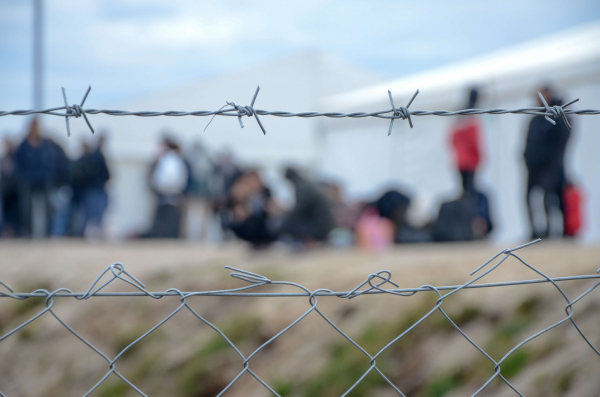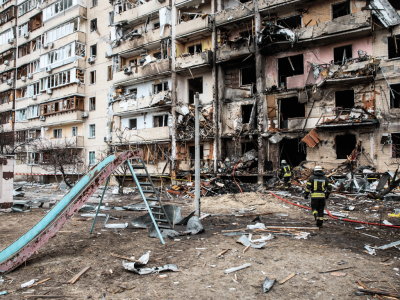
There is no reason to penalise entering the “border strip” to bring relief supplies over the border wall. A court has cancelled fines imposed by the Border Guard.
A violation of the ban on entering the border strip and bringing objects across the border with Belarus cannot be penalised under the Code of Administrative Offences, a court in Hajnówka has ruled, cancelling six fines imposed by the Border Guard on humanitarian aid workers. Together with the Szpila Collective, the HFHR offers legal assistance to people who are repressed because of their help at the Polish-Belarusian border.
Fines for humanitarian aid
In February 2023, the Border Guard imposed fines on several people who had helped migrants on the other side of the wall erected on the border with Belarus. The assistance included handing over food, drinks and dry and warm clothing.
Border guards imposed fines (up to PLN 300 to 500) for violations of the ban on entering the zone adjacent to the state border, the so-called "border strip", and the ban on bringing objects across the border with Belarus. These bans result from two regulations issued by the Podlasie Province Governor. In July, the Administrative Court in Białystok annulled the Governor's regulation banning the throwing of objects over the border wall after the Ombudsman lodged a complaint. The Administrative Court in Białystok found that the governor had exceeded his powers by issuing this measure, but the governor has appealed the ruling, so the judgment is not yet final.
Border Guard invoked Article 54 of the Code of Administrative Offences, which allows it to punish violations of peacekeeping measures effective in public places.
Court: Code of Administrative Offences not applicable
The fined persons have availed themselves of the legal assistance offered by the HFHR and the Szpila Collective to all persons who have been subjected to repression for their involvement in relief work on the Polish-Belarusian border. The activists' lawyer filed a motion to cancel the fines and pointed out that his clients should not be punished under the Code of Administrative Offences.
In October 2023, the Bielsk-Podlaski District Court’s Criminal Division sitting in Hajnówka cancelled 6 fines imposed on the activists. The court was of the opinion that regulations issued by the Provincial Governor cannot give rise to liability for an offence referred to in Article 54 of the Code of Administrative Offences.
The court emphasised that article 54 of the Code of Administrative Offences is a blanket provision, so that the court must examine very carefully whether this provision can be applied; in particular, it must be determined whether the peacekeeping regulations whose violation is being punished have been properly enacted and are in accordance with the Constitution, among other things.
According to the Court, the conduct of the aid workers cannot be classified as an offence under article 54 of the Code of Administrative Offences. According to this provision, penalties may be imposed for violations of the rules of “conduct” in public places. However, the Province Governor’s regulation prohibited “presence” in a 15-metre wide strip along the state border. “Conduct” and “presence” are two different terms, and in criminal law the rules should be applied precisely, so there can be no expansive interpretation in this case. In addition, the court noted that the Code of Administrative Offences allows for the punishment of violations of “peacekeeping laws”, i.e. laws whose purpose is to protect public order. The application of article 54 of the Code of Administrative Offences is also prevented by the fact that the governor's regulations were issued for purposes other than the maintenance of public order (border protection and border traffic control). The court also emphasised that the regulation of the Governor of the Podlaskie Province imposing a ban on entering the entire border strip constituted a ban on the disposal of the person of a citizen and thus the Governor interfered in the area of a constitutionally protected freedom. In one of the judgements, the court pointed out that an aid worker acted in a state of necessity in order to save the health and lives of the migrants.
“The decisions of the Hajnówka Court show that the Border Guard's practice of either imposing fines or filing criminal charges for violations of the ban imposed by the governor is wrong. The court clearly emphasised that there is no legal basis for applying the Code of Administrative Offences in these cases”, says Jarosław Jagura, an HFHR lawyer who defended the activists.
“It's wrong for someone to have to justify themselves in court because they have helped others. The court judgment confirmed that our actions were lawful. I'm happy about that, but that should be the norm. The humanitarian crisis is still ongoing and the aid provided can save people's health and lives. The state should support this and not persecute those who help”, says Faustyn, one of the people who received a fine.
“It’s hard not to welcome the lifting of the fine and the fact that a court has once again found that the Border Guard is making political and unlawful decisions that criminalise helping people on the move. At the same time, the reasoning behind the decision – which in my case is mainly based on reasons related to the lawmaking rules – does not make me happy. What I would like to hear is that the right to life and dignity is above borders, that supporting people in search of a better life or even survival in general is simply more important than a regulation or a law”, says a person providing assistance at the border.
“I am very happy about this judgement because it confirms what we – activists working at the border – have been repeating for a long time: no aid is illegal. Winter is coming and there are still people in the forest who need and will need food, drink, dry clothes and shoes. Our actions are criminalised, regulations are invented to hinder our work, but this judgment makes it clear: humanitarian aid is not only right from a moral point of view, but also from a legal point of view”, says Marta, one of the people who was fined.
The court’s decisions are final and incontestable. The content of the decisions can be viewed below. The decisions are part of a series of judgements stating that humanitarian aid cannot be penalised. We have reported on one of these judgements in detail here.


